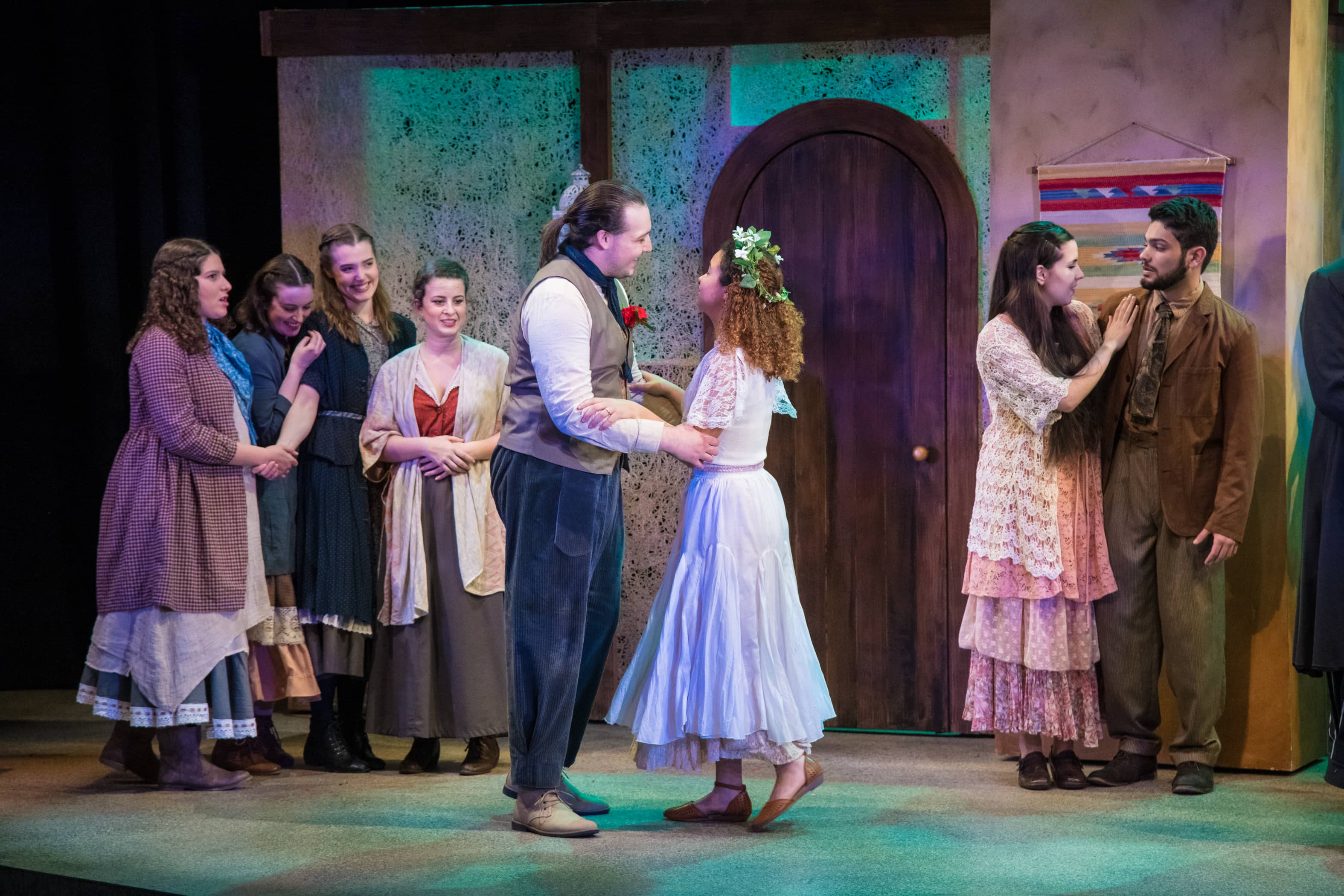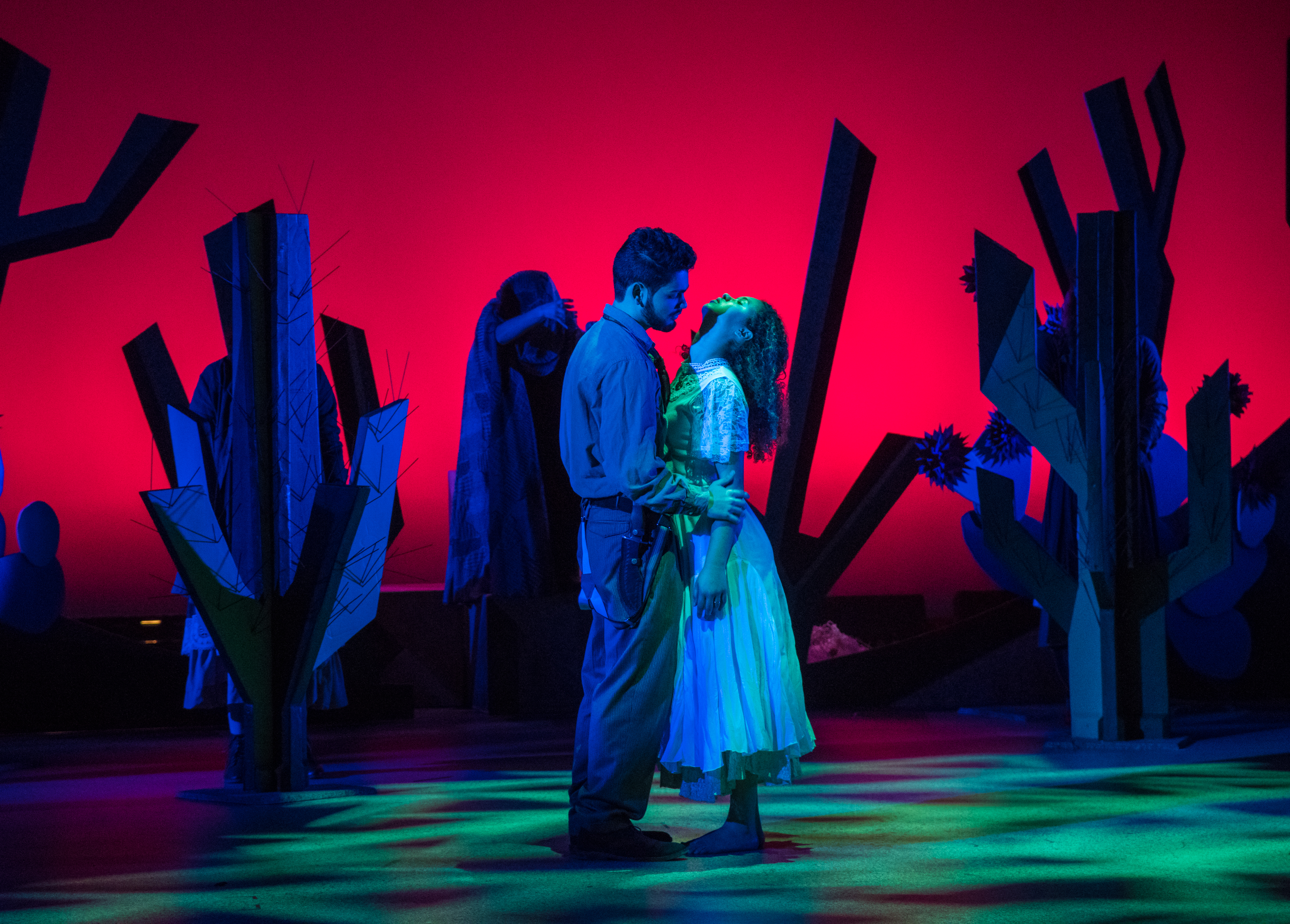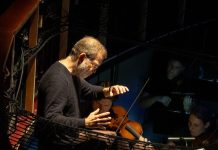Though he had a wide stylistic range, in America, Federico García Lorca’s fame as a playwright is mostly limited to his rural tragedy, Blood Wedding (Bodas de Sangre) which was originally staged in 1933, only three years before the poet and dramatist was assassinated by nationalist forces in the early stages of the Spanish Civil War. Whether his killers were motivated more by his politics or by his sexuality remains a matter of debate. Nonetheless, until 1953, all of Lorca’s writings were banned by Francisco Franco’s Falangist Regime. We must keep this in mind – the fascist mindset sees in Lorca a writer to whom the only appropriate responses are persecution, assassination, and censorship. This is why he remains relevant. There is a visceral quality to his work that cannot be tamed.

A young, morally upstanding landowner who has grown up with his mother and works his vineyards with his own hands is on the eve of marriage. His bride-to-be is the motherless daughter of another landowner with no sons to inherit and work his arid mountainside. All are happy with the match, but the title alone is sufficient warning that things do not end happily. The bride had had a previous suitor, Leonardo Felix. After their engagement was called off, Leonardo married the bride’s cousin and started his own family. Leonardo comes from a line of killers, it was members of the Felix family who murdered the groom’s father and elder brother, and Leonardo himself seems a man possessed of cruelty – contemptuous of his wife and mother-in-law, and even disdainful of the well-being of the horse he races around the countryside at all hours of the night. It is notable that in a world populated with archetypes, Lorca has only given one character a proper name, reserves that for the one who violates every convention of decency.
It must be said that Caridad Svich’s translation of Lorca’s Bodas de Sangre is a gorgeous text in which prose, song, and both rhymed and free verse flow into one another with a skillful artistry that captures Lorca’s own thematic concerns of eros and violence; life and death; mythic symbolism; and the everyday concerns of family, community, work, and honor.
This production, performed by students at American University’s Department of Performing Arts and under the direction of faculty member Kyle Bostian is in connection with Svich’s residency as a guest artist at AU. It is fair to note that while the training of student actors must include being challenged by works of artists like Lorca and Svich so they have something to which to aspire, they can neither be expected to have the facility with language to find the musicality in the text, nor the gravitas to navigate the nuances of the characters.
Nonetheless, there were some noteworthy moments: The maid (Alexandra Baca) and the guitarist (Austin Burrell) have some good comic business together and when it is time for Baca to sing, she proves to have excellent technique, a rich timbre, and good movement technique. Ross Bollinger gets a few minutes of comically eccentric comic formality in his first scene as the father of the bride.
However, while I am obligated to defend the students from my more critical impulses as they are young and deserve gentleness at this stage in their training (indeed, even on the professional level, the actor is generally the least deserving of blame when things don’t work) I am obligated not to hold back with the professionals who lead the production team. There is an inconsistent tone throughout this particular production that does justice neither to the text nor the students learning their craft.
Though Bostian has had a long engagement with Lorca’s work (he is the author of Death’s Ballad, a play about Lorca’s life) he seems to direct the script in the style of a Broadway musical: The mythic archetypes seem to be alternately flattened into mere spectacle or melodramatic stereotypes, and as much as the story and language is about such earthy themes of labor (whether in the home or the fields), lust, blood (in both the literal and figurative sense), family vendettas, and the rituals and taboos that bind communities and generations, the staging is constantly tugging towards banal escapism.
A case in point: every time a scene stage demands that the theatrical flats be rearranged, we get a pretty ballet and tango-influenced dance (performed with great aplomb by Bella Lundquist) but the dance distracts – not just from the work being done on stage (one of Lorca’s central themes) – but from the visceral musicality that Lorca and Svich bring.
Another strange choice is displacing Lorca’s rural tragedy from the Spanish countryside to the Southwestern United States of the early 1930s. It leads one to ask why, given that the groom owns a vineyard and alcohol is in evidence at the wedding reception, is Prohibition never once mentioned? This displacement is only acknowledged in theatrical flats meant to evoke adobe-style architecture, the decorations hanging on the walls of the house of the bride’s family, and the desert wilderness of cacti in the third act. Did the production team decide that an American audience would be unable to empathize with the people of rural Spain before the Civil War, and see nothing relevant to our contemporary concerns, unless we can pretend that they’re Americans living near the Mexican border?
This being a well-funded university production, it’s not surprising that the costumes, designed by Barbara Tucker Parker, are excellent, showing layers of subtly contrasting colors, textures, and patterns (especially with the dresses.) Additionally, there’s a great deal of individual variation even in the costumes of the supernumerary characters.

Scenic Designer Samina Veith does nice work in the first act dressing the different adobes with props that reflect the values of the people who dwell within. But her standout work is in the third act, with the highly-stylized, almost expressionist, cacti that populate the desert. Lighting Designer Jason Arnold also sticks to convention for the first two acts, before creating a beautiful blood-moon lit desert sky to illuminate the cacti.
Movement Director Robb Hunter seems likewise enamored of musical theater conventions that don’t serve the play: not just with the distracting dances of the scene changes, but in the way that the folk dances that mentioned in the dialogue are never seen on stage, and we get showy yet clichéd movements instead,
Sound Designer and Composer Neil McFadden provides a mish-mosh of inspired ideas and head-scratchers. The moaning desert winds of the third act are wonderfully surreal, but then there are jarring moments when actors relying on the natural projection of their voices in the auditorium must share scenes with actors whose voices are amplified through the room’s sound system – one suspects that the desired effect was to evoke the supernatural but the results just sound poorly mixed.
Similar problems of sound balance and mixing abound with the pairing of prerecorded music (some of which is quite interesting) and the live vocals. There are further incongruities when the score to a play about earth and blood is becomes dominated by bland synthesizer washes near the end.
What is important about this production is that Caridad Svich’s residency as a guest artist at American University is a gift both to the students and faculty of AU and to the city’s larger theatrical community. Meanwhile, my appetite is whetted for more professional productions of Svich’s Lorca (as of this writing, she has translated all but three of his plays) as well as Svich’s original work.
Running Time: Two hours, including one 15-minute intermission.
Blood Wedding (Bodas de Sangre) plays through April 15, 2018, at Harold and Sylvia Greenberg Theatre – 4200 Wisconsin Avenue, N.W. in Washington, D.C. For tickets, call (202) 885-3634 or order online.





Estoy entusiasmado de encontrar blogs donde hay informacion tan necesaria como esta. Gracias por poner este post.
Saludos